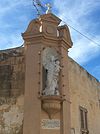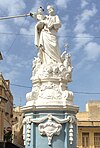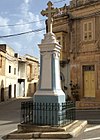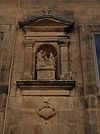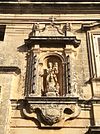
Gudja is a village in the Southern Region of Malta, with a population of 3,148 as of March 2017. The village is located on high grounds, south of Valletta. It is administered by the Gudja Local Council. A number of schools, clubs, public gardens and recreations places are found around the village.

Fort Ricasoli is a bastioned fort in Kalkara, Malta, which was built by the Order of Saint John between 1670 and 1698. The fort occupies a promontory known as Gallows' Point and the north shore of Rinella Bay, commanding the entrance to the Grand Harbour along with Fort Saint Elmo. It is not only the largest fort in Malta but also the largest in Europe, and it has been on the tentative list of UNESCO World Heritage Sites since 1998, as part of the Knights' Fortifications around the Harbours of Malta.

The Cottonera Lines, also known as the Valperga Lines, are a line of fortifications in Cospicua and Birgu, Malta. They were built in the 17th and 18th centuries to form the outer defences of the Three Cities of Birgu, Senglea and Cospicua. They surrounded an earlier line of fortifications, known as the Santa Margherita Lines.

The Floriana Lines are a line of fortifications in Floriana, Malta, which surround the fortifications of Valletta and form the capital city's outer defences. Construction of the lines began in 1636 and they were named after the military engineer who designed them, Pietro Paolo Floriani. The Floriana Lines were modified throughout the course of the 17th and 18th centuries, and they saw use during the French blockade of 1798–1800. Today, the fortifications are still largely intact but rather dilapidated and in need of restoration.

The Cittadella, also known as the Castello, is the citadel of Victoria on the island of Gozo, Malta. The area has been inhabited since the Bronze Age, and the site now occupied by the Cittadella is believed to have been the acropolis of the Punic-Roman city of Gaulos or Glauconis Civitas.

The Chapel of St Mary is a medieval chapel located in Bir Miftuħ, limits of Gudja, Malta.
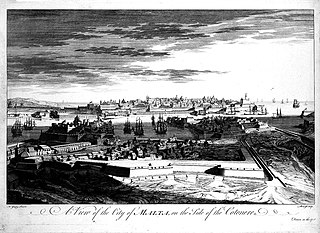
The Santa Margherita Lines, also known as the Firenzuola Lines, are a line of fortifications in Cospicua, Malta. They were built in the 17th and 18th centuries to protect the land front defences of the cities of Birgu and Senglea. A second line of fortifications, known as the Cottonera Lines, was later built around the Santa Margherita Lines, while the city of Cospicua was founded in the 18th century within the Santa Margherita and Cottonera Lines.

The fortifications of Valletta are a series of defensive walls and other fortifications which surround Valletta, the capital city of Malta. The first fortification to be built was Fort Saint Elmo in 1552, but the fortifications of the city proper began to be built in 1566 when it was founded by Grand Master Jean de Valette. Modifications were made throughout the following centuries, with the last major addition being Fort Lascaris which was completed in 1856. Most of the fortifications remain largely intact today.
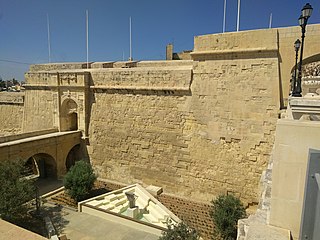
The fortifications of Birgu are a series of defensive walls and other fortifications which surround the city of Birgu, Malta. The first fortification to be built was Fort Saint Angelo in the Middle Ages, and the majority of the fortifications were built between the 16th and 18th centuries by the Order of Saint John. Most of the fortifications remain largely intact today.

The fortifications of Senglea are a series of defensive walls and other fortifications which surround the city of Senglea, Malta. The first fortification to be built was Fort Saint Michael in 1552, and the majority of the fortifications were built over the next decade when it was founded by Grand Master Claude de la Sengle. Modifications continued until the 18th century, but large parts of the fortifications were demolished between the 19th and 20th centuries. Today, all that remain of Senglea's fortifications are the seaward bastions and part of the land front.
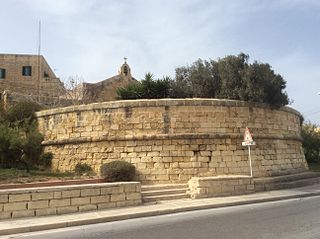
Saint George Redoubt is a redoubt in Birżebbuġa, Malta. It was built in 1714–1716 by the Order of Saint John as one of a series of coastal fortifications around the Maltese Islands, and it got its name from a chapel dedicated to St. George which was incorporated within the redoubt. Today, the redoubt and chapel still exist and they are in good condition.
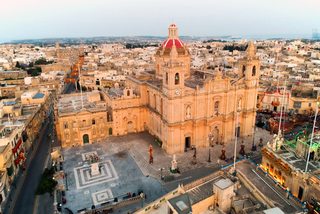
The Church of St Catherine, Żejtun, is a Roman Catholic church, the seat of the archpriest of Żejtun and the mother church of various parishes established from the originally larger territory of the Żejtun parish. The parish church, its oratory and an adjacent pastoral centre form a complex of Grade 1 and 2 listed buildings in the centre of town. The Church and its complex sit in front of the Il-Gwiedi quarter, commanding views from both the Tal-Barrani and Triq l-Aħħar Ħbit mit-Torok town approaches.

The National Inventory of the Cultural Property of the Maltese Islands (NICPMI) is a heritage register listing the cultural property of Malta. The inventory includes properties such as archaeological sites, fortifications, religious buildings, monuments and other buildings. The NICPMI is under the responsibility of the Superintendence of Cultural Heritage (SCH), which was founded in 2002 to replace the Antiquities Act. The NICPMI was established on 16 December 2011.
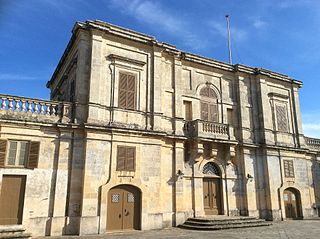
Palazzo Dorell also known as Bettina Palace, is a 17th-century Palladian palace located in Gudja, Malta.
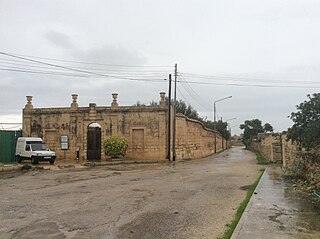
The Ġonna tal-Kmand, formerly known as Ġonna tal-Kutnent and sometimes known as Ball Gardens, are a group of gardens in various localities in Malta, which were built in the early years of the 19th century when the island was a British protectorate. The gardens were commissioned by Civil Commissioner Alexander Ball between 1802 and 1805, and were given to the Luogotenenti in charge of the towns or villages.
Vincenzo Dimech was a Maltese sculptor. He is best known for his religious sculptures, which include the titular statues of Gudja and Floriana. He also sculpted monuments or architectural features in Valletta and Corfu.














